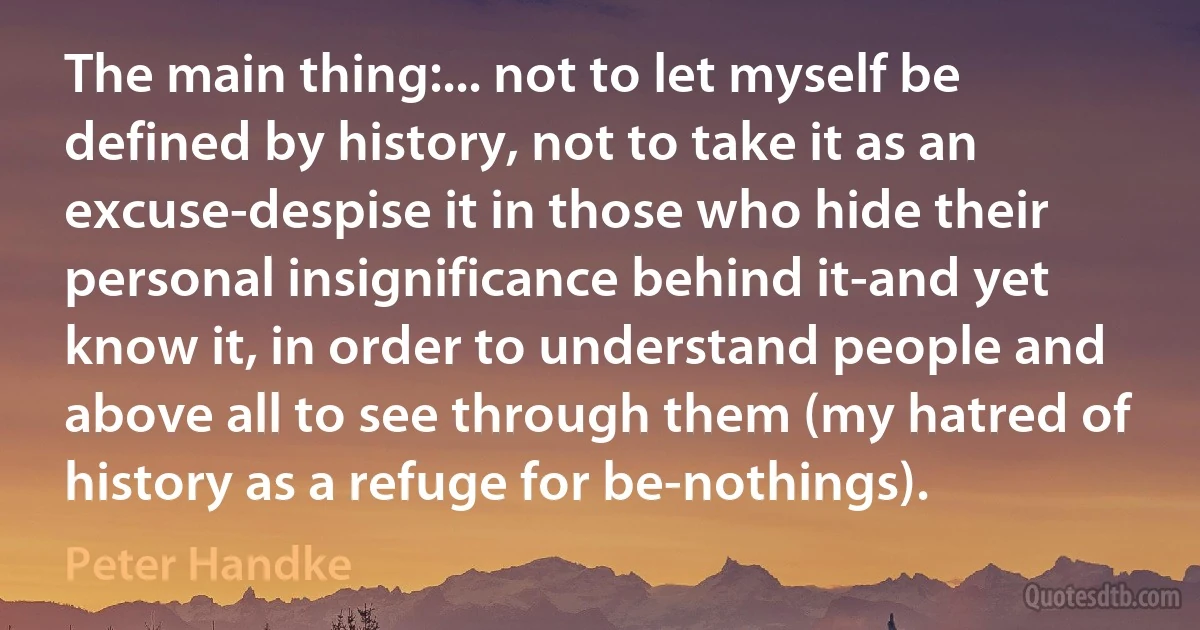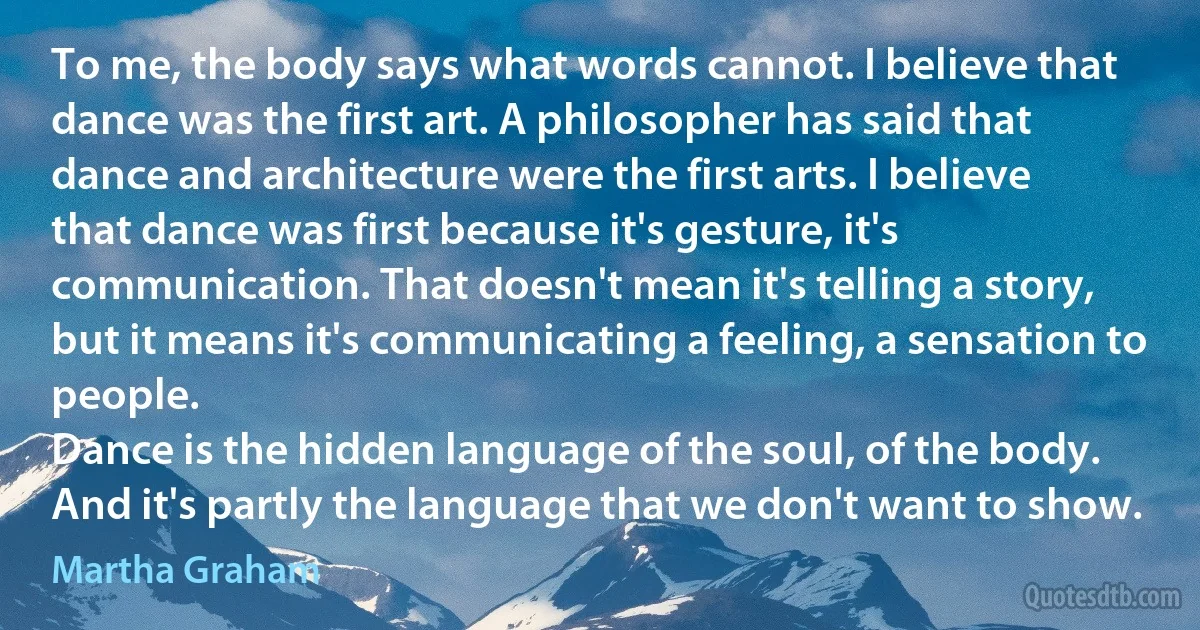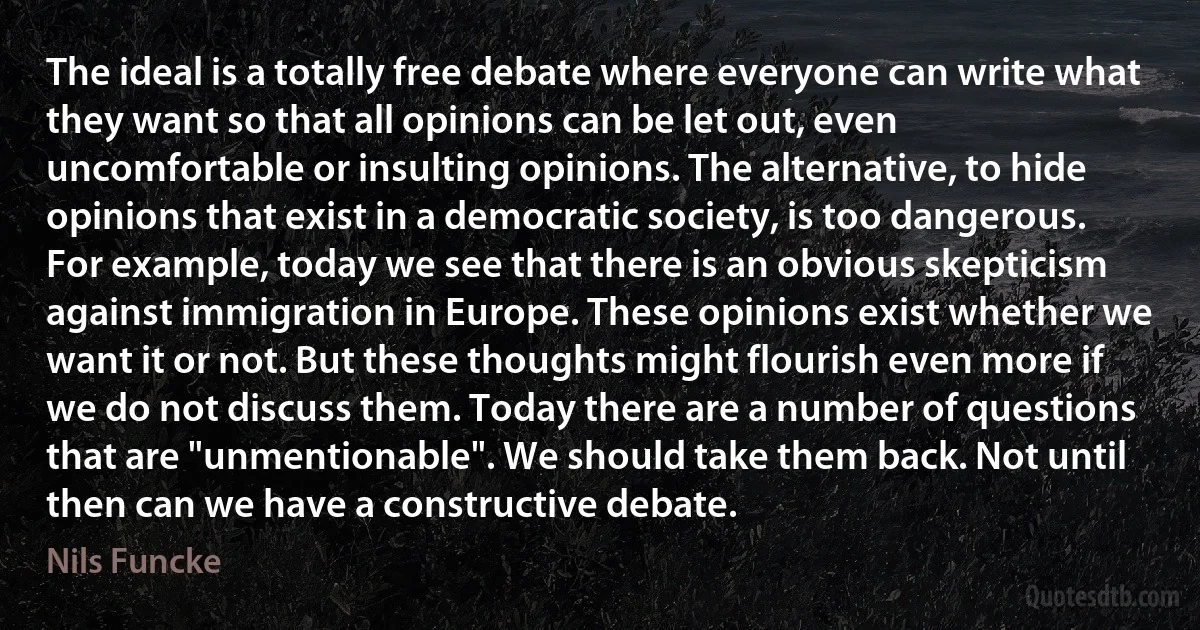Hide Quotes - page 81
On former Solicitor-General and 2019 opposition senatorial candidate Florin Hilbay: He acts like a man and pretends that Agot is his girlfriend. Be true to yourself. You're gay. Don't hide behind a cover. You were made by God. God made a mistake. Just because he's a God does not mean he is incapable of making mistakes.

Rodrigo Duterte
He was campaigning for the Congress Party on the second day of voting in the world's largest democratic election when a powerful bomb, hidden in a basket of flowers, exploded killing him instantly. It later emerged that a female Tamil Tiger (LTTE) suicide bomber had assassinated Rajiv Gandhi. In 1987 Mr Gandhi, then Prime Minister, had sent Indian Peace Keeping Forces to Sri Lanka in a disastrous attempt to impose peace in the country. The move proved unpopular both at home and abroad and his troops pulled out in 1990.

Rajiv Gandhi
The word "death" is not pronounced in New York, in Paris, in London, because it burns the lips. The Mexican, in contrast, is familiar with death, jokes about it, caresses it, sleeps with it, celebrates it; it is one of his favorite toys and his most steadfast love. True, there is perhaps as much fear in his attitude as in that of others, but at least death is not hidden away; he looks at it it face to face, with impatience, disdain or irony.

Octavio Paz
Vain are the beliefs and teachings that make man miserable, and false is the goodness that leads him into sorrow and despair, for it is man's purpose to be happy on this earth and lead the way to felicity and preach its gospel wherever he goes. He who does not see the kingdom of heaven in this life will never see it in the coming life. We came not into this life by exile, but we came as innocent creatures of God, to learn how to worship the holy and eternal spirit and seek the hidden secrets within ourselves from the beauty of life. This is the truth which I have learned from the teachings of the Nazarene.

Kahlil Gibran
I must be myself. I cannot break myself any longer for you, or you. If you can love me for what I am, we shall be the happier. If you cannot, I will still seek to deserve that you should. I will not hide my tastes or aversions. I will so trust that what is deep is holy, that I will do strongly before the sun and moon whatever inly rejoices me, and the heart appoints. If you are noble, I will love you; if you are not, I will not hurt you and myself by hypocritical attentions. If you are true, but not in the same truth with me, cleave to your companions; I will seek my own. I do this not selfishly, but humbly and truly. It is alike your interest, and mine, and all men's, however long we have dwelt in lies, to live in truth. Does this sound harsh to-day? You will soon love what is dictated by your nature as well as mine, and, if we follow the truth, it will bring us out safe at last.

Ralph Waldo Emerson
We hide this universality if we can, but it appears at all points. We are as ungrateful as children. There is nothing we cherish and strive to draw to us but in some hour we turn and rend it. We keep a running fire of sarcasm at ignorance and the life of the senses; then goes by, perchance, a fair girl, a piece of life, gay and happy, and making the commonest offices beautiful by the energy and heart with which she does them; and seeing this we admire and love her and them, and say, "Lo! a genuine creature of the fair earth, not dissipated or too early ripened by books, philosophy, religion, society, or care!" insinuating a treachery and contempt for all we had so long loved and wrought in ourselves and others.

Ralph Waldo Emerson
How small man is on this little atom where he dies! But how great his intelligence! He knows when the face of the stars must be masked in darkness, when the comets will return after thousands of years, he who lasts only an instant! A microscopic insect lost in a fold of the heavenly robe, the orbs cannot hide from him a single one of their movements in the depth of space. What destinies will those stars, new to us, light? Is their revelation bound up with some new phase of humanity? You will know, race to be born; I know not, and I am departing.

François-René de Chateaubriand
There is a tendency in the Muslim community to play the victim and the target of media and political conspiracies. Whilst I don't dispute the media is unfair in its portrayal of Muslims, and that our governments have hidden agendas to protect their financial interests in lands where populations are primarily Muslim, I think we should take up the example of the Prophet and be more "in control" of our reactions and our opportunities to make dawa through personally instigating positive change in our local communities. We must reach out to our neighbours not with an agenda of conversion, but in simple acts of sincere love. We must stop blaming everybody else for our struggles and hardships and start to take action in our own lives through sincere efforts to improve who we are as individuals.

Dawud Wharnsby
The Greeks understood the mysterious power of the hidden side of things. They bequeathed to us one of the most beautiful words in our language - the word "enthusiasm" - en theos [Εν Θεος] - a god within. The grandeur of human actions is measured by the inspiration from which they spring. Happy is he who bears a god within and obeys it.

Louis Pasteur
To enjoy anything, we cannot be attached to it. William Blake understood this beautifully: He who binds to himself a Joy, Doth the winged life destroy; But he who kisses the Joy as it flies / Lives in Eternity's sunrise. What we usually try to do is capture any joy that comes our way before it can escape. We have our butterfly net and go after the joy like a hunter stalking his prey. We hide and wait, pounce on it, catch it, and take it home to put on our wall. When our friends come to visit, we say, "Hey, Stu, would you like to see my joy?" There it is on the wall - dead. We try to cling to pleasure, but all we succeed in doing is making ourselves frustrated because, whatever it promises, pleasure simply cannot last. But if I am willing to kiss the joy as it flies, I say, 'Yes, this moment is beautiful. I won't grab it. I'll let it go.'

Eknath Easwaran
I want to begin by thanking Ms. Hutchison for her testimony today. We are all in her debt. Our nation is preserved by those who abide by their oaths to our Constitution. Our nation is preserved by those who know the fundamental difference between right and wrong. I want all Americans to know that what Ms. Hutchison has done today is not easy. The easy course is too hide from the spotlight -- to refuse to come forward, to attempt to downplay or to deny what happened.

Elizabeth Cheney
You see the mountain, and hill following after hill, as wave on wave, you see the woods and orchard, the fields of ripe corn, and the meadows reaching to the reed-beds by the river. You see me standing here beside you, and hear my voice; but I tell you that all these things - yes, from that star that has just shone out in the sky to the solid ground beneath our feet - I say that all these are but dreams and shadows; the shadows that hide the real world from our eyes. There is a real world, but it is beyond this glamour and this vision, beyond these 'chases in Arras, dreams in a career,' beyond them all as beyond a veil. I do not know whether any human being has ever lifted that veil; but I do know, Clarke, that you and I shall see it lifted this very night from before another's eyes. You may think this all strange nonsense; it may be strange, but it is true, and the ancients knew what lifting the veil means. They called it seeing the god Pan.

Arthur Machen
Through use and abuse of hidden postulates, of bold, often ill-founded extrapolations, a pseudoscience has been created. It is taking root in the very heart of biology and is leading astray many biochemists and biologists, who sincerely believe that the accuracy of fundamental concepts has been demonstrated, which is not the case. Wishing to point out this type of misconception, we quote P. T. Mora, an American biochemist, who writes about polysaccharides contained in the cell membrane:.

Pierre-Paul Grassé
Every great deed of which history tells us, every mighty passion which art can represent, every picture of manners, of civic arrangements, of the culture of peoples of distant lands or of remote times, seizes and interests us, even if there is no exact scientific connection among them. We continually find points of contact and comparison in our own conceptions and feelings; we get to know the hidden capacities and desires of the mind, which in the ordinary peaceful course of civilised life remain unawakened.
It is not to be denied that, in the natural sciences, this kind of interest is wanting. Each individual fact, taken by itself, can indeed arouse our curiosity or our astonishment, or be useful to us in its practical applications. But intellectual satisfaction we obtain only from a connection of the whole, just from its conformity with law.

Hermann von Helmholtz
I do not wish by what I have said to raise any exaggerated expectations as to the worth of these ancient hymns of the Veda, and the character of that religion which they indicate rather than fully describe. The historical importance of the Veda can hardly be exaggerated; but its intrinsic merit, and particularly the beauty or elevation of its sentiments, have by many been rated far too high. Large numbers of the Vedic hymns are childish in the extreme: tedious, low, commonplace. The gods are constantly inyoked to protect their worshippers, to grant them food, large flocks, large families, and a long life; for all which benefits they are to be rewarded by the praises and sacrifices offered day after day, or at certain seasons of the year. But hidden in this rubbish there are precious stones.

Max Müller
The first element is the experience of the power of being which is present even in the face of the most radical manifestation of non being. If one says that in this experience vitality resists despair, one must add that vitality in man is proportional to intentionality.
The vitality that can stand the abyss of meaninglessness is aware of a hidden meaning within the destruction of meaning.

Paul Tillich



